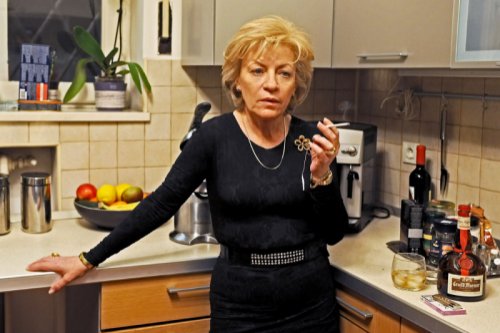Reviews - Child's Pose
Child's Pose
Reviewed By Stephen Pye

Child's Pose
All kinds of monstrous mothers rage and rail in the movies, including those who love too little or too much. In Douglas Sirk's 1959 melodrama, "Imitation of Life", Lana Turner plays one type, a selfish white woman who's blissfully indifferent to her child's needs. Yet the more disturbing mother is played by Juanita Moore as a black domestic who smothers her own daughter in so much goodness that it's no surprise that the girl flees. At the end, the saint's daughter throws herself on her mother's coffin; it's a wonder she doesn't leap in front of a train. In "Child's Pose", a drama with a story as cold, merciless and inevitable as a tomb, escape proves every bit as futile. When you first see Cornelia - played by the astonishing Romanian actress Luminita Gheorghiu — she's seated on a sofa, a scowl creasing her face and a cigarette burning in her hand. Her bleach job and fussy accouterments telegraph the kind of class privilege that's grasped bauble by bauble or has come late in life, but these trappings are less showy than the complaints she bitterly recites about a man. While she makes him sound like a lover, he turns out to be her only child, Barbu (Bogdan Dumitrache), which suggests that something is rotten in Bucharest, where much of the story unfolds. The more she talks, the more obvious it becomes that the hardness edging her mouth isn't new.
Cornelia talks a great deal in "Child's Pose", a film in which every conversation reverberates with hidden meanings, veiled threats and the lingering history of a nation that's traded one master for another. Written by Razvan Radulescu and directed by Calin Peter Netzer, the film is at once an allegory about the new Romania and a slice of naturalism that turns on a traffic accident that has left a boy dead and Barbu's future in jeopardy. It's a ghastly scene made worse when Cornelia, who has raced to the police station where Barbu is being held, announces that she's the "mother of the boy" who caused the accident before she rushes to clean up his mess.
It sounds heavy and it plays as lightly as a ton of cascading bricks, starting from the moment that Cornelia; her husband, Aurelian (Florin Zamfirescu); and her sister-in-law, Olga (Natasa Raab), begin coolly calculating how to aid Barbu. As they toss out names of doctors and lawyers — the hand-held camera darting about like a fidgety silent witness — Cornelia and the others sound like bureaucrats trying to hammer out the details of a minor contract. By the time Cornelia bustles into the police station, she has taken command of both the film and its unfolding fiasco, telling Barbu and the cops what to do and cooing about "my baby."
The long conversation between mother and daughter in law, excoriating in its detail, demonstrates more than anything the brilliance of Radelscu's screenwriting. We have a tendency to overlook this kind of creativeness, which can lift a film from the merely good to the potentially great, this reviewer has seen no better example than the script for "Child's Pose."
The film is clearly East European, and in many ways a typical commentary on the corrupt and sometimes decaying societies which have unfolded in the wake of state communism. Here though a universal disquiet somehow inhabits the film: how far would we go to protect our children, especially if we have the means and finance to do so, against those who have comparatively little?
Alongside last weeks glorious "Gloria" , "Child's Pose" has been for me the hit of the season. Little wonder both received top awards at Berlin in 2013.
Cornelia talks a great deal in "Child's Pose", a film in which every conversation reverberates with hidden meanings, veiled threats and the lingering history of a nation that's traded one master for another. Written by Razvan Radulescu and directed by Calin Peter Netzer, the film is at once an allegory about the new Romania and a slice of naturalism that turns on a traffic accident that has left a boy dead and Barbu's future in jeopardy. It's a ghastly scene made worse when Cornelia, who has raced to the police station where Barbu is being held, announces that she's the "mother of the boy" who caused the accident before she rushes to clean up his mess.
It sounds heavy and it plays as lightly as a ton of cascading bricks, starting from the moment that Cornelia; her husband, Aurelian (Florin Zamfirescu); and her sister-in-law, Olga (Natasa Raab), begin coolly calculating how to aid Barbu. As they toss out names of doctors and lawyers — the hand-held camera darting about like a fidgety silent witness — Cornelia and the others sound like bureaucrats trying to hammer out the details of a minor contract. By the time Cornelia bustles into the police station, she has taken command of both the film and its unfolding fiasco, telling Barbu and the cops what to do and cooing about "my baby."
The long conversation between mother and daughter in law, excoriating in its detail, demonstrates more than anything the brilliance of Radelscu's screenwriting. We have a tendency to overlook this kind of creativeness, which can lift a film from the merely good to the potentially great, this reviewer has seen no better example than the script for "Child's Pose."
The film is clearly East European, and in many ways a typical commentary on the corrupt and sometimes decaying societies which have unfolded in the wake of state communism. Here though a universal disquiet somehow inhabits the film: how far would we go to protect our children, especially if we have the means and finance to do so, against those who have comparatively little?
Alongside last weeks glorious "Gloria" , "Child's Pose" has been for me the hit of the season. Little wonder both received top awards at Berlin in 2013.
Find A Film
Search over 1475 films in the Keswick Film Club archive.
Friends
KFC is friends with Caldbeck Area Film Society and Brampton Film Club and members share benefits across all organisations
Awards
Keswick Film Club won the Best New Film Society at the British Federation Of Film Societies awards in 2000.
Since then, the club has won Film Society Of The Year and awards for Best Programme four times and Best Website twice.
We have also received numerous Distinctions and Commendations in categories including marketing, programming and website.
 Talking Pictures
The KFC Newsletter
Talking Pictures
The KFC Newsletter
Links Explore the internet with Keswick Film Club


